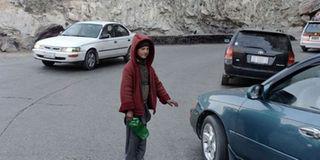What are churches doing on inequality?

An Afghan child Hedayat guides traffic with a plastic bottle through The Mahipar Gorge along the Kabul-Jalalabad Highway on February 4,2016. Hedayat, 8, guides traffic with his bottle from dawn to dusk on the highway, making roughly 3 USD daily. Poverty and insecurity has forced thousands of children into child labour in Afghanistan. PHOTO | AFP
What you need to know:
- According to the aid agency Oxfam, the richest 62 people in the world are as wealthy as half the world’s population put together, which is 3.6 billion.
- This inequality is unacceptable and outrageous but how does one respond? For many people religion is an escape rather than inspiration.
- Oxfam report states that 30 percent of all African financial wealth is held in offshore accounts.
We live in a very unfair and unequal world. According to the aid agency Oxfam, the richest 62 people in the world are as wealthy as half the world’s population put together, which is 3.6 billion.
Put another way, 1 percent of the world own more than the other 99 percent combined. That makes shocking reading, but worse still is that the wealth of the poorest 50 percent in the planet dropped by 41 percent in the past five years.
Moreover, there is no sign of a reversal in these trends. Global economists will be challenged by those statistics. But for believers, the question is how one can speak about God in the light of horrific suffering, premature deaths and endemic poverty.
This inequality is unacceptable and outrageous but how does one respond? For many people religion is an escape rather than inspiration.
The gospel of prosperity is a mere clamour for material blessings and religion just one more commodity for sale in the market. Millions yearn for success without work, prayer without social commitment and preaching without any demands.
Yet, theologians in Latin America delved deeper into scripture and tradition to uncover what God was saying in the midst of such suffering and injustice.
SOCIAL TRANSFORMATION
They rediscovered a God of life, concerned with our holistic development; a liberator who chose to take the side of the poor, beginning with the call of Moses. A Theology of Liberation endeavoured to show that God seeks to lead his people from oppression and dependence into life in all its fullness.
Liberation goes beyond reform and development and demands a complete social transformation of society, whereby the poor are given priority and a voice. Yet, poverty and corruption go hand in hand in this continent.
The Oxfam report states that 30 percent of all African financial wealth is held in offshore accounts. That is $7.6 billion and the tax revenue from that each year is enough to provide trained teachers for every child on the continent.
We have become immune to corruption and have settled for a less than healthy relationship with the state. Pope Francis says that corruption is a system, a mental habit, a condition feeling no need to change or regret.
He wrote that after his recent visit. He says the corrupt person has no shame but justifies his behaviour without apology.
DISH OUT MILLIONS
That repulsive condition is reflected in the manner politicians dish out millions every weekend and clerics joyfully receive without questioning its source. Mr Kenyatta recently said that some religious leaders should be in Kamiti Prison. He has a point but they should be joined there by politicians who corrupt religion for their own survival through prayer rallies and fundraisers.
The only difference between fraudulent churches and fraudulent politicians is the manner in which they dress.
Yet as long as over one billion people live in poverty there is need for liberation theology. When more than 20 million Kenyans cannot afford three meals a day nor provide a decent education for their children, then religious leaders should not remain silent.
Churches were not established to be self-serving but to be a light to the world. Where are the thinkers and liberators of today?
[email protected] @GabrielDolan1





